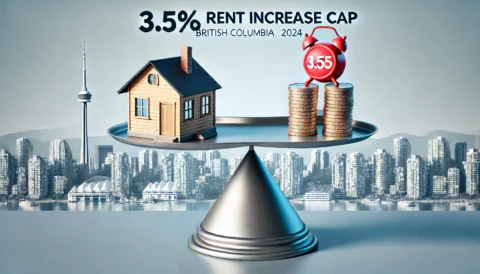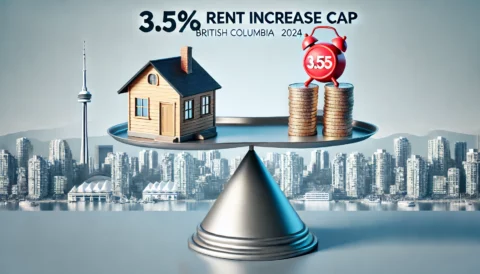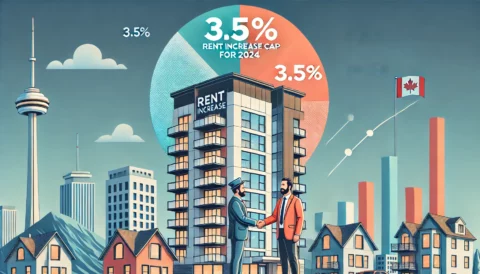Rent increases in B.C. capped at 3.5% until 2024

Advertisement: Click here to learn how to Generate Art From Text

Understanding the 3.5% rent increase cap in B.C. For 2024
The British Columbia Government has set a limit of 3.5% on rent increases for 2024, to balance the needs and wants of both tenants and landlords.
This article will explore the topic of Residential Tenancy Act(RTA) and other Residential Tenancy Branch(RTB) to provide a complete understanding of this balance.
The 3.5% cap: What it means for tenants and landlords
The 3.5% cap on rent increases was designed to provide tenants with stability and predictability in a difficult economic environment.
What the 3.5% cap means for landlords
The cap on rent increases is a way for landlords to limit rent increases while still allowing them to cover the rising costs of maintenance and operations. This allowed increase does not reflect the actual increase in revenue after inflation, as annualized inflation is 3.5% by June 2024.
Rent increases are sought
There are some situations where landlords will have significant expenses which may justify a rise above 3.5%. These expenses include major repairs and system replacements as well as compliance with new safety standards. To apply for an additional increase in rent, landlords have to complete a detailed RTB application.
What is the application process?
Landlords are required to provide detailed documentation of costs incurred, such as receipts and invoices, and submit an official application to the RTB. The tenants must be informed about the application, and given the opportunity to review it and respond. The RTB reviews the application. It considers the necessity and reasonableness in the costs, as well as the financial impact to tenants and possible alternatives.
Balancing Tenant and landlord needs
The RTB’s goal is to ensure that any approved rent increase is justified and necessary. It balances the financial viability for landlords while protecting tenants against significant rent hikes. For landlords, it is important to have a transparent communication process and complete documentation. Tenants should be informed about their rights and review process.
What this Means for a Balanced Renting Market
The cap on rent increases of 3.5% in British Columbia until 2024 is a strategic move to balance the needs of landlords and tenants.
Understanding the process of additional rent increases, and the criteria used to approve them, helps both parties navigate through this regulatory landscape. By maintaining this balance the policy aims at fostering a stable, equitable rental market throughout the province.
Rents not being raised enough can lead to a decrease in the demand for rental housing and a reduction of its supply.
Historical Context
The British Columbia Residential Tenancy Act, or RTA, regulates rental contracts and rent increases. These increases have historically been influenced largely by economic conditions, inflation and housing market dynamics. The 3.5% cap for 2024 is part of the government’s strategy to address housing affordability issues worsened by the COVID-19 pandemic.
Rent increases in Canada are influenced by the inflation rate, housing demand and government regulations.
Rent control measures were introduced in some provinces after World War II due to the urbanization and economic growth that followed. BC, however, did not.
Rent control policies were widespread in the 1970s and 80s, but their effectiveness varied. In the 1990s, and in the early 2000s, rents increased due to deregulation.
Rents have increased significantly in recent years due to rapid population growth and a lack of housing in Vancouver, BC, and other cities.
What is the current inflation rate in Canada and how does it impact rent?
As of June 2024 the inflation rate in Canada is estimated to be approximately 3.5% annually.
Rent increases are affected by inflation in several ways.
Cost of living:Rents may rise as the cost for goods and services increases.
Interest RatesIn order to combat inflation, central banks often increase interest rates. This can increase mortgage costs for landowners. Rent increases are a common way for landlords to pass on the higher costs.
Wage Growth If wages do not keep pace with inflation, tenants’ ability to afford higher rents diminishes, potentially leading to increased vacancy rates or demand for more affordable housing options.


FAQ: Rent Increases in B.C. Rent increases in B.C. are capped at 3.5% until 2024
What is Maximum?You can also find out more about the A-Team here.llowableRent Increase in British Columbia for 2024?
The maximum rent increase allowed in British Columbia for 2024 is 3.5%.
Why has the government set a cap of 3.5% on rent increases?
The cap of 3.5% was set to provide stability for tenants and predictability, helping them to manage their housing costs. It also recognizes the financial needs of landlords.
Can Landlords increase rent by more than 3.5% by 2024?
Yes, landlords may request an additional increase in rent if they have significant costs that are not covered by the 3.5% cap. This application is submitted to the Residential Tenancy Branch for approval.
What type of costs might justify an increase in rent?
Rent increases may be justified if there are significant expenses like major repairs, system upgrades (e.g. plumbing, heating, electrical) or compliance with new municipal bylaws or safety regulations.
How can landlords apply for an additional rent increase?
Landlords are required to submit a detailed request to the RTB. This includes all necessary documentation (invoices and receipts, contracts, etc.) as well as a full explanation of the costs incurred. They must also inform all affected tenants of the application.
What criteria does RTB consider when reviewing applications for additional rent increases?
The RTB (Residential Tenancy Branch), examines the cost, its necessity, and the impact it will have on tenants. It also looks at alternative solutions that can be used to manage expenses without significant rent increases.
How are you?The following are some of the ways to get in touch with each other:enantsNotified of an application for a rent increase?
Landlords must inform all tenants affected about the application. This will allow them to review documents and give feedback. Tenants are required to be notified at least three months in advance of the proposed increase.
What rights do tenants possess if a landlord increases the rent?
The RTB has the right to receive feedback from tenants regarding the application. They can raise concerns regarding the necessity and reasonableness and the impact of the costs on their finances.
What should landlords do to strengthen their application for an additional rent increase?
Landlords are encouraged to keep detailed records on all expenses related to the property, to communicate openly with tenants and to seek professional advice in order to ensure that they meet RTB requirements.
What Should Tenants Do If They Receive Notice of a Rent Increase Request?
Tenants should carefully read the application and any supporting documents. They should also understand the reasons for the increase requested. If they have any concerns, tenants can provide feedback to RTB.
Where can tenants and landlords find more information about rent increases and their rights?
The Residential Tenancy Act and the Residential Tenancy Branch website provide more information for both tenants and landlords. Other resources and advice are available from tenant advocacy groups as well as professional legal advisors.

‘ Credit:
Original content by http://www.mikestewart.ca/ – “Rent increases in B.C. are capped at 3.5 percent for 2024”.
Read the full article here https://www.mikestewart.ca/rent-increase-in-b-c-capped-at-3-5-for-2024/




